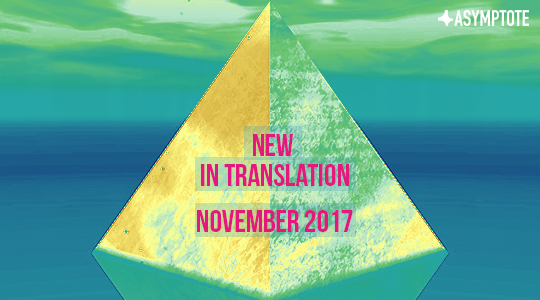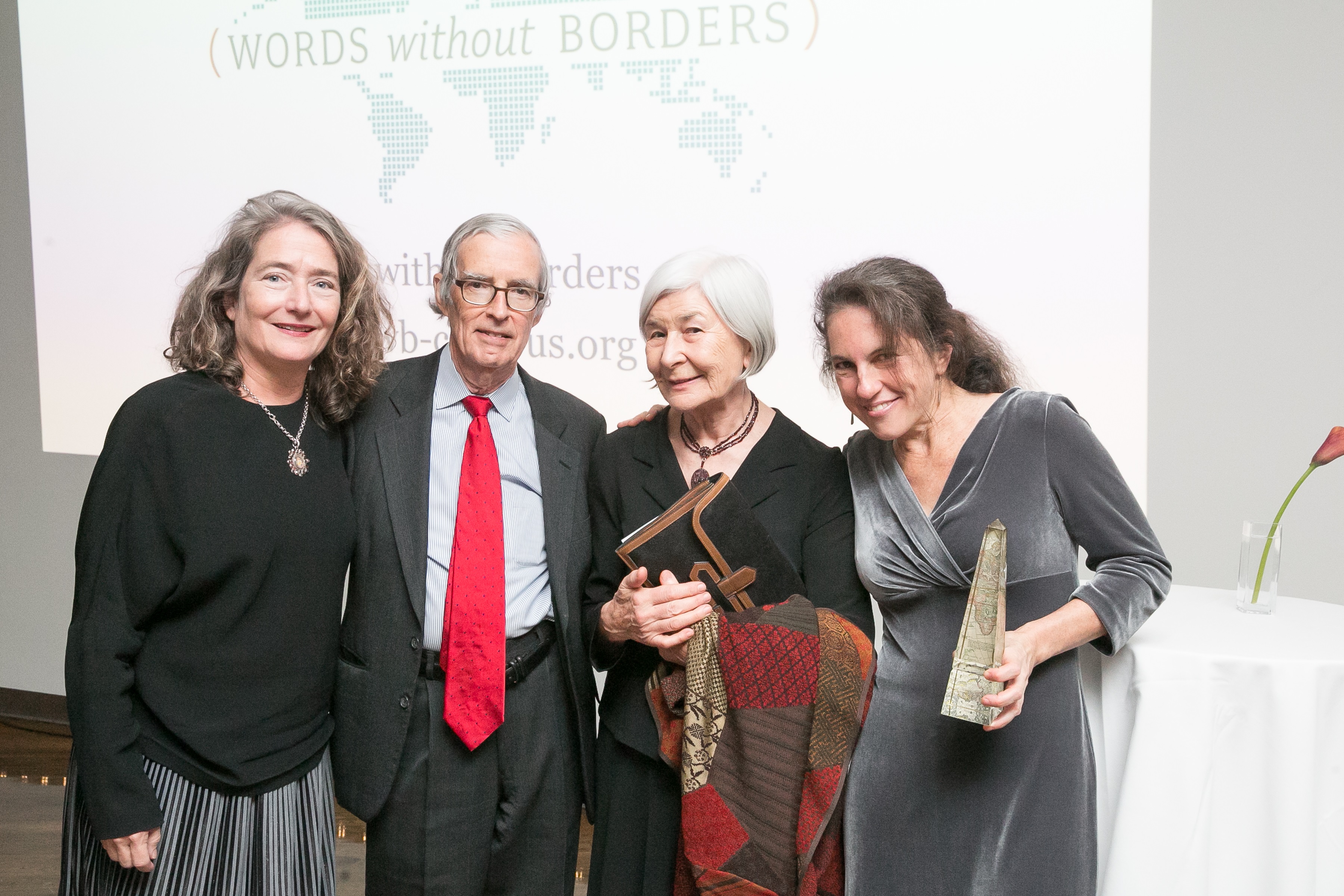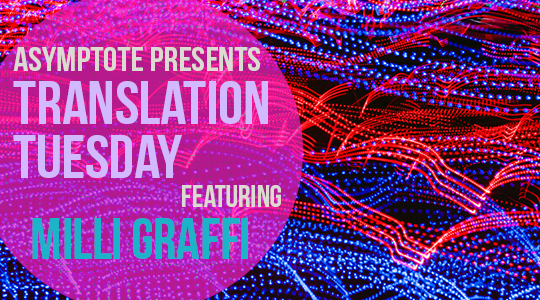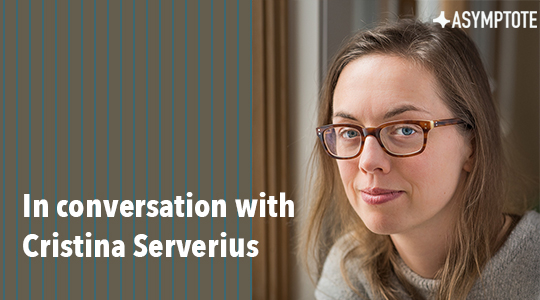Monthly Archives: November 2017
Asymptote Podcast: Language, Meet Arto Lindsay

In this episode of the Asymptote Podcast, Editor-at-Large Lara Norgaard speaks with the experimental Brazilian-American musician, Arto Lindsay.
Weekly Dispatches from the Frontlines of World Literature

The most important literary news from Hong Kong, Romania, Moldova, and the UK.
It’s Friday and that means we are back with the latest literary news from around the world! From Hong Kong, Editor-at-Large Charlie Ng brings us the latest on theater, literary festivals, and poetry readings. MARGENTO brings us exciting news about past Asymptote-contributors and other brilliant writers from Romania and Moldova. Finally, our own assistant blog editor, Stefan Kielbasiewicz shares news about poetry in the UK.
Charlie Ng, Editor-at-Large, Hong Kong
November is a month filled with vibrant literary performances and festivals in Hong Kong. On stage from late October to early November, a Cantonese version of The Father (Le Père) by French playwright, Florian Zeller, winner of the Molière Award for Best Play, is brought to Hong Kong audiences by the Hong Kong Repertory Theatre for the first time.
The seventeenth Hong Kong International Literary Festival kicked off on November 3 with a grand dinner with Scotland’s well-loved crime fiction writer, Ian Rankin, who also attended two other sessions as a guest speaker: Mysterious Cities: the Perfect Crime Novel and 30 Years of Rebus with Ian Rankin. Carol Ann Duffy was another Scottish writer featured in this year’s Festival. The British Poet Laureate read her poetry with musician John Sampson’s music accompaniment on November 9. The dazzling Festival programme includes both international authors such as Hiromi Kawakami, Amy Tan, Min Jin Lee, Ruth Ware, Hideo Yokoyama, and local writers and translators such as Xu Xi, Louise Ho, Dung Kai-cheung, Nicholas Wong, Tammy Ho, and Chris Song.
What’s New in Translation: November 2017

Looking for your next novel? Here are three of the most exciting new releases from around the world.
Every month, batches of books arrive fresh on the shelves of bookstores around the world. Our team has handpicked three exciting new reads to help you make up your minds on what to sink your teeth into, including novels from Martinique, France, and Hungary.

The Dancing Other by Suzanne Dracius, Translated from the French by Nancy Naomi Carlson and Catherine Maigret Kellog, Seagull Books
Reviewed by Madeline Jones, Editor at Large, United States
The Dancing Other opens as our anti-heroine Rehvana stumbles out of a dingy apartment in Paris, just barely escaping literal branding by the other members of the Ébonis, or the “Sons of Agar”—an African god. Rehvana wants nothing more than to be included in and loyal to this insular community of Antillean immigrants that tries to emulate traditional Martinique culture—though how authentically they manage this aspiration is debated among some of Dracius’s other characters.
Rehvana’s boyfriend Abdoulaye is the group’s leader, whose temper has more than once manifested itself in blooming bruises across Rehvana’s face and arms. But the kind, protective Jeremy holds no allure for her. Jeremy and Rehvana’s formidable older sister, Matildana, tell her blatantly that a young woman such as her has no business slumming it with this cultish group of wannabes, but Rehvana both resents and resists her smarter, more pretentious, whiter sister’s warnings. She takes her newly enforced identity to its final phase by running away without a word back to the homeland, to Martinique, with another man she just met and who immediately consumes her thoughts and energies.
Jill Schoolman Honored at the Glamorous WWB Gala

Young people are being told that America comes first. I think we are here tonight because we believe otherwise and because we read otherwise.
The annual Words Without Borders gala celebrated the fifth anniversary of the Ottaway Award for the Promotion of International Literature on November 1, named for the first chair of the board, Jim Ottaway. This year, the award honored Jill Schoolman, publisher of Archipelago Books. Archipelago has been a stalwart of the small but dedicated cohort of advocates for international literature in the U.S. since Jill founded the house in 2003—the same year Words Without Borders was created. In her humble, sincere acceptance speech, she told the room full of publishers, writers, translators, educators, and philanthropists, “I’ve felt a special kinship with WWB from the beginning. We created ourselves around the same time for many of the same reasons… Books that Archipelago publishes allow us to lose ourselves in other cultures and explore other worlds. It is our extraordinary translators who guide us through those worlds. We are extremely lucky to be working with such talented translators who are able to make books come alive for us, in both language and spirit. This wonderful award also belongs to them, too.”
Translation Tuesday: “Love Crisson” by Milli Graffi

Talklossenette wavening / the palpid culdicurve / ambashes.
I fell in love with the poetry of Milli Graffi in 2008, when I was seeking authors to include in a dossier for Aufgabe on “poesia ultima e della ricerca,” or the latest Italian poetry of research. It was immediately clear to me that we had heroes in common—Lewis Carroll and James Joyce in particular.
There’s a section in Finnegans Wake on Anna Liva Plurabelle in which Joyce speaks of “loosening your talktapes.” When he translated this passage into Italian, Joyce himself rendered this phrase as “scioglilinguagnolo,” a translation that likely reveals the matrix of the original notion he had in mind: in English, we speak of tongue twisters, or what we might render in Italian as attorci–lingua, while in Italian one uses the term “scioglilingua,” or tongue-dissolvers, tongue-thawers, tongue untiers. The Italian idiomatic expression might very well have been the origin of the “loosening” that ended up in Finnegans Wake, a book in which all languages converge in tangles of phonemes and roots.
I discovered this point of correspondence in a book of English exercises that Milli Graffi edited for Paravia publishers, aimed at high school students—because Graffi, unstoppable champion of the avant-garde that she is, chose this mind-twistingly complex passage for the teaching volume. When we got together this summer in Milan to prepare for a public chat on translation, on a sultry heat-thickened afternoon further stultified by a city-wide transit strike, Milli told me that she had used the word in a poem, and I knew that I had to try translating it.
The work was published in Mille graffi e venti poesie, 1977-78 (Geiger, 1979), and I soon found that Graffi had rendered Joyce’s phrase even more Byzantine, because she transformed scioglilinguagnolo into sperdilinquagnolo, turning the action of loosening embedded in the original Italian phrase into loss (sperdersi refers to losing oneself; sperdere means dispersal, scattering), and lingua (“tongue; language”) into linqua, some sort of calque tending toward the English “linkage” while containing the heavily deictic “qua” (Italian “here”; Latin “what; as; in the capacity of”). I took other necessary liberties while working with this poem: my translation of ambiscia is a calque of ambassador and ambush, and so on. A proper gloss would proceed word by word, but I’ll leave it up to readers to discover some tripwires of their own.
—Jennifer Scappettone
In Conversation: Cristina Serverius on Teaching and Translation

It is extremely important for education to be rooted in place, and for children to learn about the world through their immediate surroundings.
As a postdoctoral research fellow at Simon Fraser University’s Centre for Education, Law, and Society, Cristina Serverius continues her lifelong quest to “understand humans, understand the self, and understand community,” while promoting educational environments that encourage all its participants to thrive. Native to Belgium, she earned an M.Ed in Contemplative Inquiry and Approaches from SFU and a Ph.D. in Comparative Literature from Brown University. Cristina currently works as an educational consultant. Asymptote for Educators Lindsay Semel interviews her about the questions driving her interdisciplinary inquiries and how they manifest in the classroom.
LS: From the perspective of a border-crossing scholar (in terms of discipline, country, and language), can you speak about the extent to which education is or isn’t a field/practice rooted in place? How does your foreignness impact your relationships within the schools?
CS: I think it is extremely important for education to be rooted in place, and for children to learn about the world through their immediate surroundings. We do children (and the environment!) a great disservice by denying them an intimate knowledge of their surroundings in favor of studying the world “at arm’s length,” as physicist Arthur Zajonc calls the learning enforced in many schools, which adhere to a rigid barrier between self and object of study. How are we supposed to learn to care for a neighbor or a local marshland when we are taught in a context of separation; how can we examine the far-away before we explore that which is close by? In Belgium, we call secondary school “humaniora,” a place where one becomes a human. Most schools, for a variety of structural, systemic, and societal reasons, have forgotten their role in this process and have been reduced to places where (a certain kind of) knowledge transfer either happens or, frustratingly, doesn’t happen.
Obviously, when looking at place-based education, we have to consider that places (and the communities that inhabit them) change over time. Place-based education in Belgium, for example, must include exploration of the large Maghrebi communities; the village church and the mosque are both opportunities for place-based learning. As such, it is representative of contemporary society for Canadian schools to have staff who did not attend Canadian elementary or secondary schools, and a great deal of the children attending school now are first-generation Canadians. Bringing in staff who do not have a Canadian background can lay bare and put up for debate some of the things we do “because they’ve always been done this way,” and that can only be healthy for any organization. My (or any other foreigner’s) learning about the school system starts a conversation that necessarily leads to self-reflection for those who have been embedded (in this case) in the Canadian system. Those are wonderful conversations that advance learning for both parties.
Asymptote’s new Fall issue is replete with spectacular writing. See what our section editors have to say about the pieces closest to their hearts:
As writer-readers, we’ve all been there before. Who of us hasn’t been faced with that writer whose words have made us stay up late into the night; or start the book over as soon as we’re done; or after finally savoring that last word, weep—for all the words already written and that would never to be yours. The feeling is unmistakeable, physical. In her essay, “Animal in Outline,” Mireia Vidal-Conte describes this gut feeling after finishing El porxo de les mirades (The Porch of the Gazes) by Miquel de Palol: “What are we doing? I thought. What are we writing? What have we read, what have we failed to read, before sitting down in front of a blank sheet of paper? What does and doesn’t deserve readers?” There are the books that make you never want to stop writing, and the books that never make you want to write another word (in the best way possible, of course). Vidal-Conte reminds writers again that none of us is without context—for better or for worse. Her essay is smart, playful, honest, and a must-read from this issue.
—Ah-reum Han, Writers on Writers Editor
On Żanna Słoniowska’s The House with the Stained Glass Window

A strikingly crafted window into how our lives are a mosaic of the things that happened before us.
Translated from the Polish by Antonia Lloyd-Jones. London, England: MacLehose Press, 2017. 240 pages. £12.99.
Toward the middle of The House with the Stained Glass Window, the Ukrainian-Polish writer Żanna Słoniowska’s debut novel, the unnamed narrator tells us that her great-grandmother occasionally falls into fits of hysterical sobbing, which her grandmother explains as having to do with “the past.” “I imagined ‘the past’ as an uncontrolled intermittent blubbering,” the narrator says. This definition is not a far cry from the idea of the past portrayed in The House with the Stained Glass Window: not blubbering, but certainly not controlled by human forces, intermittently entering the present day until it infiltrates it, saturates it, and finally becomes indistinguishable from it.
The novel centers around four generations of women who live under the same roof in Lviv, in a house noted for its enormous stained glass window. The window sets the present-day plot in motion: it is because of the window that the novel’s narrator, who we only know as Marianna’s daughter, meets Mykola, her mother’s former lover, and begins an affair with him herself. A relationship like that would provide enough internal and external conflict to fill a novel to its brim, but Słoniowska does not dedicate much page space to it. Instead, if anything, the affair serves as a springboard to the past, to exploring the irresistible pull of it.

